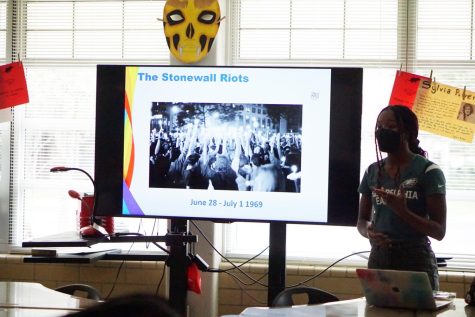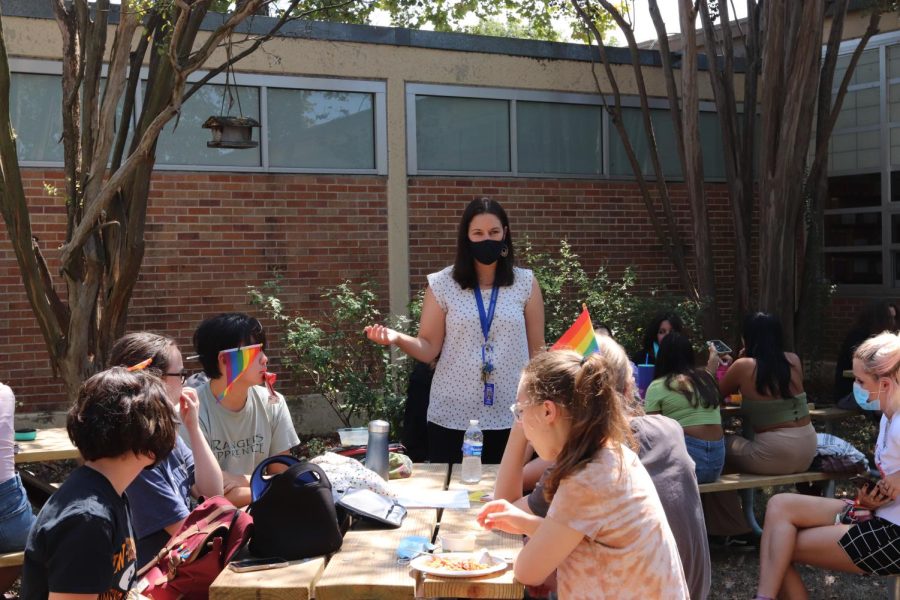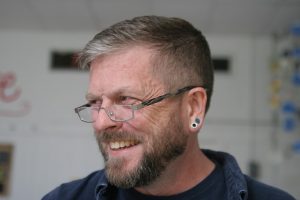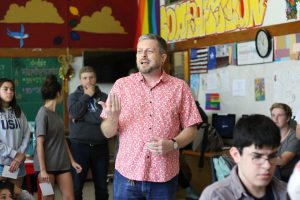A safe space for all
LGBTQ+ student group and club focuses on education, history and acceptance in the McCallum community
Principal Griffith at the first Spectrum meeting of the year. Club leaders Caytie Brown and Ceder Herring invited Griffith to a meeting so she could share her story as an LGBTQ+ person. Having the support from Griffith has allowed Spectrum to facilitate more open discussions. “I feel like other schools would be weirded out, ” Brown said. “Like, ‘The principal’s telling a story?’ But I think Mac culture is pretty accepting.”
November 21, 2021
Every week, either in the English courtyard or in Room 107, the members of Spectrum meet with snacks, smiles, open minds and open arms. Whether it be to watch movies, hear from a guest speaker, learn about LGBTQ+ history or sexual health, the goal is always simple: community.
Founded by former McCallum teacher Tim Bjerke in 2016, Spectrum is the LGBTQ+ student organization on campus. The club stemmed from the Gender Identity Club which dissolved after its senior leaders graduated.
For decades, organizations such as Spectrum and other similar gender-sexuality alliances have provided students on the LGBTQ+ spectrum around the country a place to be safe and out, with a safety net of support and anonymity.
Since Bjerke has left McCallum in 2017, Spectrum has continued to provide a “safe space” for LGBTQ+ students at Mac. Currently, the club sponsor is English teacher Nikki Northcutt and is led by junior Caytie Brown and seniors Ceder Herring and Theo Roe. Since joining the club, all three Spectrum leaders have committed to continuing the tight-knit community that welcomed them.
“Spectrum was the first group of people that I came out to my freshman year for being gender-fluid,” Herring said.
Brown found out about Spectrum through her choir companions. “It was freshman year,” Brown said, “and at the time all the leaders in Spectrum were very much choir people, so they were advertising it on the whiteboards. I asked one of my friends who was one of the leaders at the time, and they were like, ‘Yeah you should join!’ And then here we are three years later.”
Roe had a similar introduction to Spectrum. “I was friends with the previous leaders, Abacus and Skel,” Roe said, “and took over when they graduated.”
Community is one of Spectrum’s priorities, so being forced into online school and Zoom made holding meetings, activities and connecting with others difficult. At the beginning of his freshman year, sophomore Marshal Clifton was also struggling to make connections through his screen. After hearing about Spectrum from a friend, he decided to give it a try. To his surprise, Roe was aleader there, who he knew from Mac Theatre’s Bigs and Littles program. After attending a meeting, Clifton instantly fell in love with both the environment and atmosphere. Even though they were just little Zoom boxes on his computer screen, he continued to show up for club meetings. Clifton is now the social media manager for Spectrum, and the only underclassman on the leadership team.
“The other leaders reached out to me and asked if I wanted to help lead, and I was overjoyed,” Clifton said. “This was a place that had helped me so much with forming friendships and connections, and now I was getting a chance to work with the people who had made it all possible.”

As in-person school began this fall, more members have been attracted to the club as it adjusts back to the in-person Mac environment.
“We’re working to try and get back into the groove of being back,” Brown said. Several of the meetings have been outdoors, and Brown hopes other activities outside of school will follow the trend, so as to follow COVID-19 safety guidelines and keep everyone comfortable.
At Spectrum’s first meeting, outreach leader Herring and Brown brought in Principal Nicole Griffith to share her story as a married lesbian with a child. Herring cited the support from faculty as one of the things that makes Spectrum different from other LGBTQ+ student organizations. The environment and culture of McCallum has also helped to ensure Spectrum’s continued presence on campus.
“The nature of McCallum as a fine arts school draws in people of all differing points and stages of life,” Clifton said. “It fosters diversity in the best way.” Teachers like Kelly Wroblewski and Nikki Northcutt have shared their stories and identities at Spectrum meetings.
Despite positive feedback, leaders still feel that the club is relatively unknown. Other than decorating campus for AISD Pride and weekly meetings, there are few activities in which Spectrum is directly involved. This year, leaders hope to grow the impact of the club and focus on spreading awareness about LGBTQ+ issues and tackling inclusivity issues on campus.
“Even though we go to McCallum,” Brown said. “There’s still work to be done.” To accomplish this progress, Brown plans to dive deeper into the research she conducted her freshman year for a research paper about LGBTQ+ history and issues. Teaching other students, whether they exist on the LGBTQ+ spectrum or not, about the importance of acceptance is something that the Spectrum leaders hope will further the strides already made at Mac and in the greater community.
“We want to give kids who feel isolated or alone or frustrated with the world a place to be themselves and just…exist,” Clifton said.
You can follow Spectrum on Instagram @gays_at_mac for updates about meetings and events, and for LGBTQ+ resources.








Emma Hagood • Dec 3, 2021 at 11:37 pm
I actually didn’t know Spectrum was a thing, and I think it is really neat. Although I am not a LGBTQ+ student myself, a lot of my friends are, and I’m really glad they can have a safe space like this.